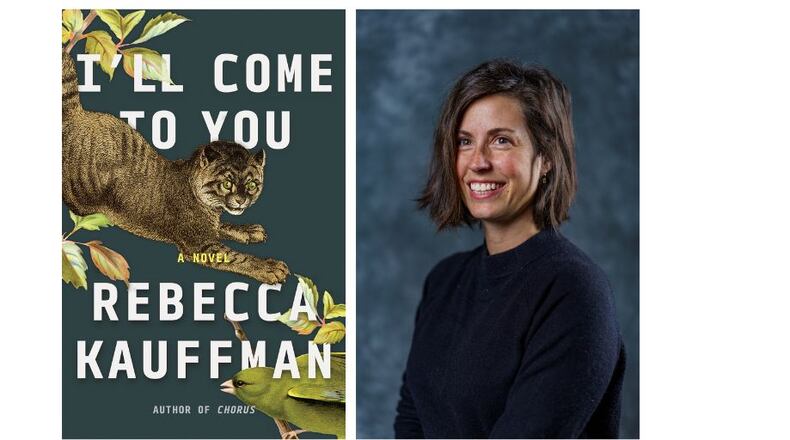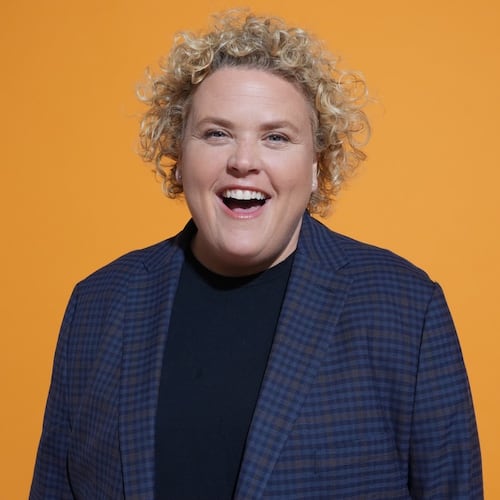It isn’t unusual for couples to grapple with how to please two sets of parents — or more, if divorce factors into their family histories — over the holidays. It’s hard to make everyone happy, Virginia author Rebecca Kauffman’s fifth novel asserts when single mother Ellen Leach complains about her first Christmas alone post-divorce on a blind date.
Ellen isn’t the only reason the date doesn’t go well. Gary drinks too much wine and reveals he baits telemarketers for entertainment, behaviors Ellen isn’t inclined to overlook. And so begins “I’ll Come to You,” Kauffman’s contemplative story brimming with quirky characters that follows two families connected by marriage preparing for the arrival of the couple’s first child.
These 21 interconnected stories cycle through the perspectives of seven different characters, forming a series of vignettes that deliver a cohesive tale. Kauffman packs an abundance of heart in her compact book as she explores the hopes, disappointments, inadequacies and triumphs of woefully normal people who aren’t always likable.
Corinne and Paul are excited for their baby, if a little apprehensive after trying “so very hard for so very long to get pregnant.” They work at a jelly factory not far from Corinne’s parents in a town called Lamb. The couple don’t reside nearly close enough to Ellen, Paul’s mother, she informs Gary on their blind date.
Feeling like she “just gradually disappeared” after 40 years of marriage to Paul’s father, a man she believes didn’t leave her for another woman but divorced her nonetheless, Ellen anticipates her first grandchild will end their separation. She embarks on a mission over the course of 1995 to cajole her family into spending the baby’s first Christmas together next December. But Paul is a complex figure with a different idea about his parents’ roles in his life as he faces down his own ambivalence toward fatherhood.
For a quiet story about working class folks trudging through the mundane, Kauffman’s narrative quickly builds suspense. By the end of the second chapter, Corinne starts spotting in a snowstorm, witnesses a confusing sex act while modeling as a tooth fairy and begins walking in the blizzard alone. It’s hard to predict which source of danger is going to catch up with her first.
A month later, Corinne’s dad, a church custodian named Bruce, writes an aching, first-person letter to his unborn grandchild. Apparently, both mother and baby survive.
Kauffman uses time to enhance this story in two distinctive and contrasting ways. “I’ll Come to You” is set 30 years in the past and each chapter is titled with the month and year. These time-stamps not only help anchor the reader as the author chronologically advances through seven shifting points of view, they help fill in the gaps when the narrative jumps ahead — as Bruce’s letter demonstrates.
But Kauffman’s time references serve an additional purpose that is far more nuanced. Despite a few mentions of answering machines or, more tellingly, the absence of cellphones or the internet, these stories are surprisingly untethered to time and place. These tales could have occurred at any point before or after the mid-1990s. By the end of the narrative, Kauffman has brilliantly communicated that the heart of human struggle hasn’t changed much, despite technological advancements.
As the perspective shifts to different family members, it’s unclear which of Corinne’s relations is traversing down the most challenging path. The reflective and melancholic tone of her father’s letter to her unborn child foreshadows his memory loss. It’s revealing when he calls his life unremarkable and says, “The vast majority of the things I’ve thought, I’ve not said aloud.”
Corinne’s older brother Rob develops a reputation for dishonesty — seemingly in reaction to his father’s inability to face uncomfortable truths. Unlike his dad, Rob is desperate to believe he is remarkable. Sadly, his shallow self-confidence presents as arrogance, and he frequently comes off as a buffoon.
In one cringeworthy episode, Rob, a car salesman, bombs career day at his sons’ school and tries to save face by passing out cash under the guise of helping the elementary school children start a fund to one day buy a car. This is but one of the numerous times Rob causes conflict while seeking approval, blunders it and becomes aloof. Nevertheless, it’s hard to dislike a man who would do anything to spend more time with his kids whom he’s watching his ex-wife raise from afar.
Corinne and Rob’s mother, possibly the most eccentric of the bunch, is searching for her own sense of permanence in the face of her husband’s memory loss. As Kauffman delves into the nitty-gritty of Corinne’s family, Corinne herself remains elusive — save for a post-birth scene many who have experienced new parenthood will appreciate. Regardless, the rest of her family is embroiled in enough conflict to round out what Corinne fails to convey.
Rebecca Kauffman has stated that she completed her 2016 debut novel “Another Place You’ve Never Been” by writing only one paragraph a day. Perhaps that practice helped shape her skill in utilizing the interconnected short-story format that works so well in “I’ll Come to You.” As Paul and Corinne adjust to parenthood, Ellen vacillates between her ex and Gary, and Rob tries to get a handle on his parents, Kauffman’s flawed characters don’t just tug on the heartstrings. They are everyday people searching for relevance who linger in the mind long after the tale concludes.
FICTION
“I’ll Come to You”
by Rebecca Kauffman
Counterpoint Press
224 pages, $26
About the Author
Keep Reading
The Latest
Featured



